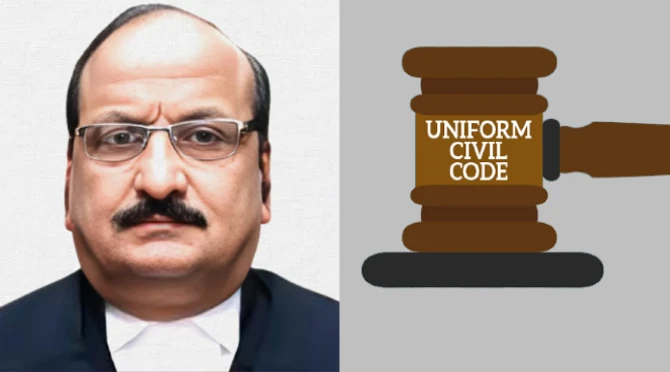
Justice Anil Verma of the Indore bench of the Madhya Pradesh High Court has emphasized the need for a Uniform Civil Code (UCC) in India, drawing parallels to the long-standing realization of the unconstitutionality and societal harm of triple talaq. His remarks came last week while partly allowing a petition from two Mumbai-based women facing charges under the Indian Penal Code (IPC), the Muslim Women (Protection of Rights on Marriage) Act 2019, and the Dowry Prohibition Act 1961.
“There are a lot of other deprecating, fundamentalist, superstitious, and ultra-conservative practices prevalent in the society that are clothed in the name of faith and belief,” Justice Verma observed. He highlighted that although Article 44 of the Indian Constitution advocates for a UCC, it remains a paper provision and needs to be actualized to curb superstitious and harmful practices, thereby strengthening national integrity.
The judge reiterated, “It took many years for the lawmakers to realize that triple talaq is unconstitutional and bad for society. We should now realize the need for a Uniform Civil Code (UCC) in our country.” He underscored that the current matter involved the Muslim Women (Protection of Rights on Marriage) Act, 2019, and emphasized the gravity of triple talaq as an issue.
The High Court’s observations came while disposing of a petition from Aliya and Farad Saiyyad, a mother-daughter duo from Mumbai. They sought to quash an FIR against them filed under the IPC, Dowry Act, and Muslim Women Act, along with consequential proceedings pending before the Judicial Magistrate First Class in Rajpur, Barwani district, bordering Maharashtra.
Salma, the complainant, had filed an FIR against her mother-in-law Aliya, sister-in-law Farad, and husband Faizan for allegedly physically and mentally harassing her for Rs 2 lakh dowry. Salma, who was married on April 15, 2019, as per Islamic rituals, accused Faizan of divorcing her by uttering ‘talaq’ three times. After being abandoned, she lodged a police complaint while residing with her parents in Barwani. Aliya, Farad, and Faizan were booked under sections 498-A and 323/34 of the IPC, section 3/4 of the Dowry Prohibition Act, and section 4 of the Muslim Women (Protection of Rights on Marriage) Act.
The petitioners’ counsel argued that the alleged offense occurred in Mumbai’s Ghatkopar area, thus Rajpur police station in MP had no jurisdiction to register the FIR. The High Court, however, stated, “It is a settled position of law that ‘ordinary rule’ engrafted in Section 177 of CrPC allows courts in another local area to take cognizance of the offense. Additionally, if an offense committed in one locality is repeated in another, the courts in the other location are competent to hear the case.”
The court added that if an offense’s consequences are felt in another jurisdiction, the court in that area is competent to take cognizance under Section 179. The counsel also contended that sections 3 and 4 of the Muslim Women (Protection of Rights on Marriage) Act 2019 apply only to the husband, not to the in-laws or other relatives.
Section 3 of the Act renders the pronouncement of triple talaq void and illegal, while Section 4 prescribes a punishment of up to three years in jail. The court clarified, “It is crystal clear that the provisions of Sections 3 & 4 operate in relation to the Muslim husband alone. Therefore, the petitioners, who are the mother-in-law and sister-in-law of the complainant, cannot be prosecuted for the offense of pronouncement of triple talaq under the Act of 2019.”
The court concluded that the charges under Section 4 against the petitioners deserved to be quashed. However, allegations in the FIR related to mental and physical harassment for non-fulfillment of dowry demands, supported by prima facie evidence, could not be quashed.




